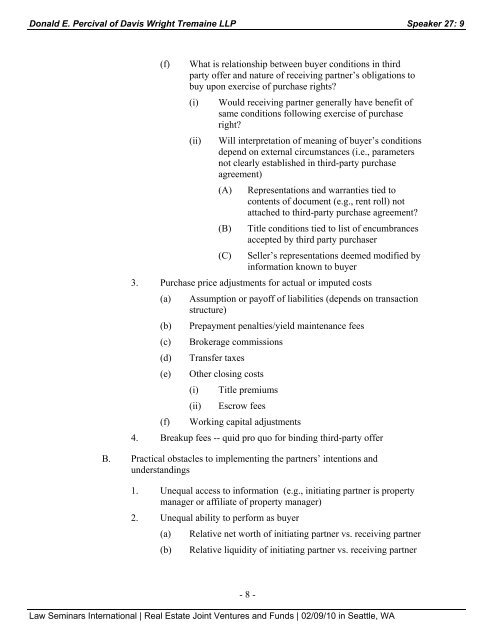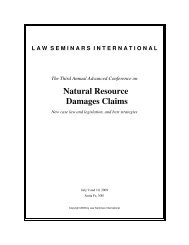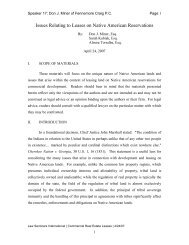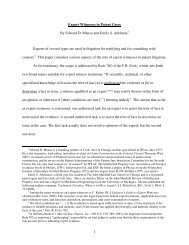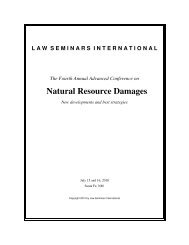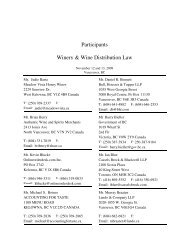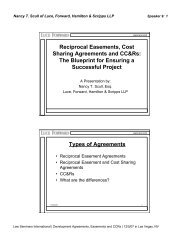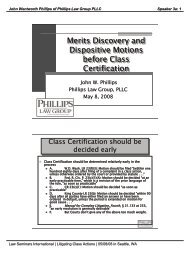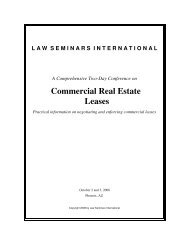- Page 1:
L A W S E M I N A R S I N T E R N A
- Page 4 and 5:
Monday, February 08, 2010 Real Esta
- Page 6 and 7:
John W. Hanley, Jr., Ste
- Page 8 and 9:
Table of Contents Topic Speaker # L
- Page 10 and 11:
Faculty for Real Estate Joint Ventu
- Page 13:
L A W S E M I N A R S I N T E R N A
- Page 16 and 17:
John W. Hanley, Jr. of Davis Wright
- Page 18 and 19:
Steven L. Wood of Century Pacific,
- Page 21 and 22:
Tracy B. Edgers of Wells Fargo Bank
- Page 23 and 24:
Tracy B. Edgers of Wells Fargo Bank
- Page 25 and 26:
Tracy B. Edgers of Wells Fargo Bank
- Page 27 and 28:
Tracy B. Edgers of Wells Fargo Bank
- Page 29 and 30:
Tracy B. Edgers of Wells Fargo Bank
- Page 31 and 32:
Steven L. Wood of Century Pacific,
- Page 33:
L A W S E M I N A R S I N T E R N A
- Page 36 and 37:
Gregory K. Johnson of Wright Runsta
- Page 38 and 39:
Gregory K. Johnson of Wright Runsta
- Page 40 and 41:
Gregory K. Johnson of Wright Runsta
- Page 42 and 43:
Gregory K. Johnson of Wright Runsta
- Page 44 and 45:
Gregory K. Johnson of Wright Runsta
- Page 46 and 47:
Gregory K. Johnson of Wright Runsta
- Page 49:
L A W S E M I N A R S I N T E R N A
- Page 72 and 73:
Joseph P. McCarthy of Stoel Rives L
- Page 74 and 75:
Joseph P. McCarthy of Stoel Rives L
- Page 76 and 77:
Joseph P. McCarthy of Stoel Rives L
- Page 78 and 79:
Joseph P. McCarthy of Stoel Rives L
- Page 80 and 81:
Joseph P. McCarthy of Stoel Rives L
- Page 83:
L A W S E M I N A R S I N T E R N A
- Page 86 and 87:
David E. Myre, Jr. of Hillis Clark
- Page 88 and 89:
David E. Myre, Jr. of Hillis Clark
- Page 90 and 91:
David E. Myre, Jr. of Hillis Clark
- Page 92 and 93:
David E. Myre, Jr. of Hillis Clark
- Page 94 and 95:
David E. Myre, Jr. of Hillis Clark
- Page 96 and 97:
David E. Myre, Jr. of Hillis Clark
- Page 98 and 99:
David E. Myre, Jr. of Hillis Clark
- Page 101 and 102:
David E. Myre, Jr. of Hillis Clark
- Page 103:
L A W S E M I N A R S I N T E R N A
- Page 106 and 107:
Brian Todd of Davis Wright Tremaine
- Page 108 and 109:
Brian Todd of Davis Wright Tremaine
- Page 110 and 111:
Brian Todd of Davis Wright Tremaine
- Page 112 and 113:
Brian Todd of Davis Wright Tremaine
- Page 114 and 115:
Brian Todd of Davis Wright Tremaine
- Page 116 and 117:
Brian Todd of Davis Wright Tremaine
- Page 118 and 119:
Brian Todd of Davis Wright Tremaine
- Page 120 and 121:
Brian Todd of Davis Wright Tremaine
- Page 122 and 123:
Brian Todd of Davis Wright Tremaine
- Page 124 and 125:
Brian Todd of Davis Wright Tremaine
- Page 126 and 127:
Brian Todd of Davis Wright Tremaine
- Page 129:
L A W S E M I N A R S I N T E R N A
- Page 132 and 133:
John W. Hanley, Jr. of Davis Wright
- Page 134 and 135:
John W. Hanley, Jr. of Davis Wright
- Page 136 and 137:
John W. Hanley, Jr. of Davis Wright
- Page 138 and 139:
John W. Hanley, Jr. of Davis Wright
- Page 141 and 142:
John M. Parker of Kennedy Associate
- Page 143:
L A W S E M I N A R S I N T E R N A
- Page 146 and 147:
Quentin Kuhrau of Unico Properties
- Page 148 and 149:
Rodney A. Bench of RA Bench, Inc. S
- Page 151 and 152:
John W. Hanley, Jr. of Davis Wright
- Page 153 and 154:
John W. Hanley, Jr. of Davis Wright
- Page 155 and 156:
John W. Hanley, Jr. of Davis Wright
- Page 157 and 158:
John W. Hanley, Jr. of Davis Wright
- Page 159 and 160:
John W. Hanley, Jr. of Davis Wright
- Page 161 and 162:
John W. Hanley, Jr. of Davis Wright
- Page 163 and 164:
John W. Hanley, Jr. of Davis Wright
- Page 165 and 166:
John W. Hanley, Jr. of Davis Wright
- Page 167 and 168:
John W. Hanley, Jr. of Davis Wright
- Page 169 and 170:
John W. Hanley, Jr. of Davis Wright
- Page 171 and 172:
John W. Hanley, Jr. of Davis Wright
- Page 173 and 174: John W. Hanley, Jr. of Davis Wright
- Page 175 and 176: John W. Hanley, Jr. of Davis Wright
- Page 177 and 178: John W. Hanley, Jr. of Davis Wright
- Page 179 and 180: John W. Hanley, Jr. of Davis Wright
- Page 181 and 182: John W. Hanley, Jr. of Davis Wright
- Page 183 and 184: John W. Hanley, Jr. of Davis Wright
- Page 185 and 186: John W. Hanley, Jr. of Davis Wright
- Page 187: L A W S E M I N A R S I N T E R N A
- Page 190 and 191: James E. Wreggelsworth of Davis Wri
- Page 193 and 194: Erin Joyce Letey of Riddell William
- Page 195 and 196: Erin Joyce Letey of Riddell William
- Page 197 and 198: Erin Joyce Letey of Riddell William
- Page 199 and 200: Erin Joyce Letey of Riddell William
- Page 201 and 202: Erin Joyce Letey of Riddell William
- Page 203: Erin Joyce Letey of Riddell William
- Page 207 and 208: John Orehek of Security Properties
- Page 209 and 210: Matthew G. Paddock of Metzler North
- Page 211 and 212: Stephen P. Latimer of ING Clarion P
- Page 213: L A W S E M I N A R S I N T E R N A
- Page 216 and 217: John W. Hanley, Jr. of Davis Wright
- Page 218 and 219: Donald E. Percival of Davis Wright
- Page 220 and 221: Donald E. Percival of Davis Wright
- Page 222 and 223: Donald E. Percival of Davis Wright
- Page 226 and 227: Donald E. Percival of Davis Wright
- Page 228: Donald E. Percival of Davis Wright


